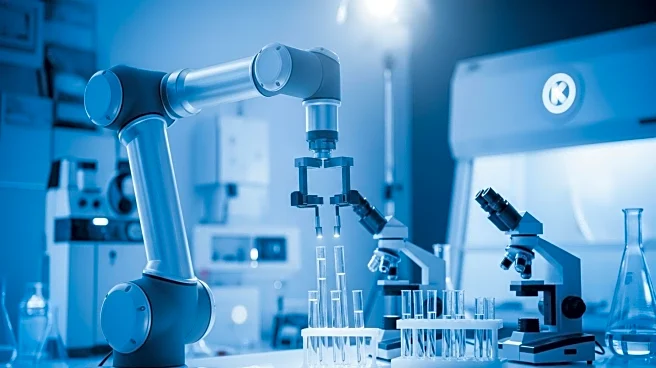What's Happening?
Ahead of the American Society of Human Genetics (ASHG) meeting, lab automation companies are launching new products and partnerships. SPT Labtech and Agilent have announced automated target enrichment protocols on SPT Labtech's firefly+ platform, supporting genomic workflows in clinical research and precision medicine. Additionally, Opentrons and BD have formed a multi-year collaboration to integrate robotic liquid-handling capabilities into BD's single-cell multiomics instruments, automating experimental steps in disease research and drug development. These developments aim to enhance research efficiency and accuracy.
Why It's Important?
The integration of automation technologies in laboratory settings is crucial for advancing research capabilities and improving experimental outcomes. Automated workflows reduce human error, increase throughput, and enable more complex analyses, benefiting fields like genomics and precision medicine. The partnerships between lab automation companies and technology developers highlight the growing demand for innovative solutions that streamline research processes. These advancements could accelerate discoveries in disease research and drug development, ultimately improving patient care and treatment options.
What's Next?
The collaborations announced will offer early access opportunities for interested labs, allowing researchers to test and refine automated workflows. As these technologies become more widely adopted, they are expected to transform laboratory practices, making research more efficient and cost-effective. Continued innovation in lab automation will likely lead to further partnerships and product developments, expanding the capabilities of genomic and multiomics research. The ASHG meeting will provide a platform for showcasing these advancements and fostering collaboration among industry leaders.
Beyond the Headlines
The move towards automation in laboratories reflects broader trends in scientific research, emphasizing the importance of technology in driving innovation. As automation becomes more prevalent, researchers will need to adapt to new methodologies and tools, potentially reshaping the landscape of scientific inquiry. The partnerships announced highlight the collaborative nature of the industry, with companies working together to develop solutions that address complex research challenges.










